Gaza crisis: Death toll from Israeli strikes 'hits 100'
- Published
A three-storey house in Rafah, Gaza, was flattened overnight in an Israeli airstrike, Tim Wilcox reports
The death toll from Israeli air strikes on Gaza has risen to 100, Palestinian sources say.
The latest deaths were of two people in a car in the Bureij area on Friday, they said.
Israel has carried out hundreds of strikes since launching its operation on Tuesday to stop rocket fire from Gaza. Militants there continue to fire on Israel, causing damage and injuries.
The US earlier offered to help with a truce in a call to Israel's PM.
Egypt and Turkey have both criticised Israel's use of force.
Lebanon rockets
The Palestinian health ministry says in addition to those killed, 675 people - mainly civilians - have been injured in Israel's Operation Protective Edge.
Israel says "dozens of terrorists" are among the dead.
James Reynolds reports from a petrol station gutted by a rocket attack in the Israeli city of Ashdod
Overnight in Gaza, an Israeli air strike on a house in Rafah killed five people - three men and two women - the health ministry said.
A second strike, it added, killed a girl in Rafah, while one militant was killed when his motorcycle was hit north of Gaza City.
In Israel, one person was seriously injured when a rocket hit a petrol station in Ashdod on Friday morning, Israeli officials say.

At the scene: BBC's Yolande Knell in Gaza, 11:00 GMT
In the past few minutes we have heard the rumble of distant Israeli air strikes.
Israel says it is targeting rocket-launching sites but it is also going after militants' homes and that is what reportedly led overnight to the deaths of five people in Rafah, including a child. The Islamic Jihad leader targeted was not home at the time. What we are hearing from local people is that some of the homes destroyed have no militant links at all.
People here are complaining that while Israel says it usually gives warnings, often they are not coming through and people do not have a chance to leave their property and that is why the civilian casualties are rising.

At the scene: BBC's James Reynolds in Tel Aviv, 11:00 GMT
Here in Tel Aviv people are still under rocket warnings. Earlier we heard sirens in this neighbourhood and people were escorted to shelters where they stayed for about five minutes.
A colleague saw some white plumes of smoke in the sky to indicate that the Iron Dome missile defence system had been fired to intercept the rockets coming from Gaza.
For the moment, that we are aware of, there are no meaningful talks or attempts to mediate a ceasefire.

Three rockets were also shot down by Israel's Iron Dome anti-missile system over Tel Aviv, the Israeli military said.
Lebanon's military also confirmed that militants in the south of the country had fired three rockets into northern Israel in the early hours of Friday and that Israel had shelled the area in response. No injuries were reported.
One Israeli soldier was injured by mortar fire in Eshkol on Thursday.
Turkish criticism
In his telephone conversation with Israeli Prime Minister Benjamin Netanyahu, US President Barack Obama said: "The United States remains prepared to facilitate a cessation of hostilities, including a return to the November 2012 ceasefire agreement."
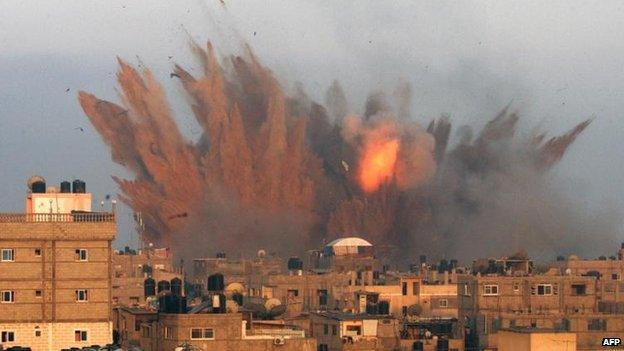
Israel has continued its air strikes on targets in Gaza
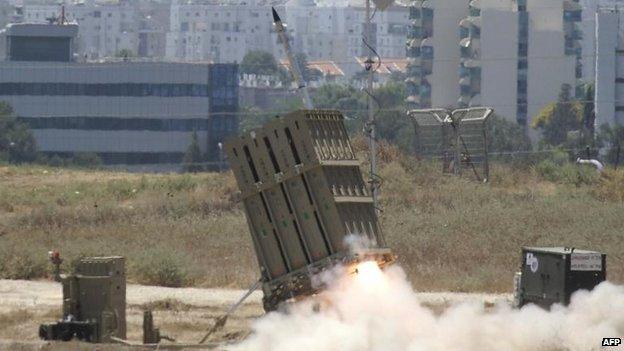
An Iron Dome missile is launched to counter rockets from Gaza
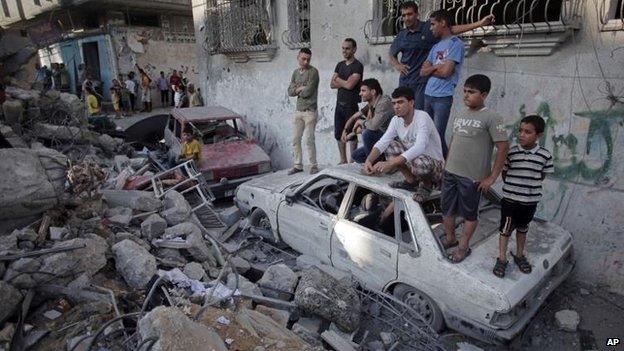
Five people were reported killed in an air strike on Rafah, southern Gaza, on Friday
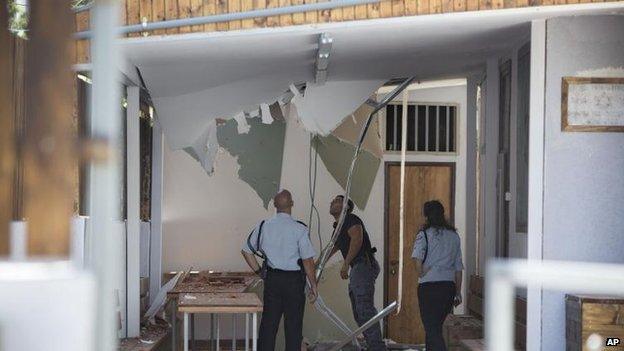
Israeli police check damage from a rocket attack on a synagogue in Tel Aviv
Condemning rocket fire by Hamas, the US president also "expressed concern about the risk of further escalation and emphasised the need for all sides to do everything they can to protect the lives of civilians and restore calm".
Middle East peace envoy Tony Blair said on Friday it was necessary to tackle the "longer-term questions at the heart of this violence and conflict".
The view from mothers on either side of the Israeli-Palestinian conflict
"Without that long-term solution in place I think it's going to be very difficult to create any short-term peace," he said.
Some 20,000 Israeli army reservists have been mobilised amid speculation of a ground offensive into Gaza.
The BBC's Kevin Connolly in Jerusalem says a ground invasion would be a big political gamble, external as the military would have to deliver a clear victory before leaving, and that would be extremely difficult.
Israel says its targets in Gaza have been militant fighters and facilities, but the Palestinian health ministry says many women and children have been killed.

Egypt's foreign ministry has condemned Israel's "excessive and unnecessary use of military force leading to the death of innocent civilians".
Egypt helped broker a truce between Israel and Hamas after a conflict in 2012.
But the BBC's Orla Guerin in Cairo says there is currently no sign that Egypt may deliver a ceasefire, as it has done in the past.
Turkish Prime Minister Recep Tayyip Erdogan also condemned Israel's latest offensive.
He said: "You have to end this oppression. As long as it does not end, a normalising of ties between Turkey and Israel is not possible."

Israel's Iron Dome missile shield
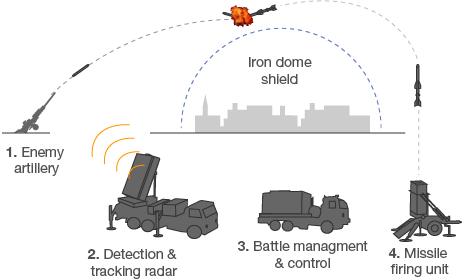
Enemy fires missile or artillery shell
Projectile tracked by radar. Data relayed to battle management and control unit
Data analysed and target co-ordinates sent to the missile firing unit
Missile is fired at enemy projectile
Are you in Israel or Gaza? How has the violence affected you? You can email your experiences to haveyoursay@bbc.co.uk, external, using the subject line 'Israel Gaza'.